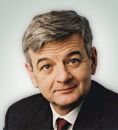Is America Turning Japanese?
The safe bet in the late 1980’s seemed to be that mechanization, computerization, and robotization would proceed. Political and economic pressure would lead more Japanese sectors to undergo the transformation to machine-intensive, high-productivity modes of organization that export-oriented manufacturing had already undergone (and that sectors like agriculture and distribution had undergone or were undergoing in the North Atlantic region).
The Japanese work ethic would persist, the reasoning went, and Japan’s high savings rate and slow population growth would give it a substantial edge in capital intensity – and thus in labor productivity – on top of whatever economy-wide advantage it might develop in total factor productivity. Moreover, proximity to a vast pool of low-wage workers would allow Japan to construct a regional division of labor that took full advantage of its high-paid, well-educated workforce and outsourced low-skill, low-wage, and hence low-productivity jobs to continental Asia.
As Japan equaled and perhaps surpassed the North Atlantic in terms of capital intensity, industrial knowhow, and standard of living, the global economy’s most highly rewarded activities – research and development in high-tech industries, high-end consumer fashion, high finance, and corporate control – would increasingly migrate to Tokyo Bay.
With one-third the population of the United States, Japan was unlikely ever to become the world’s preeminent economic superpower. But Japan would close the 30% gap (adjusted for purchasing power parity) between its per capita GDP and that of the US. The prevailing belief was that, by 2015 or so, Japan’s per capita GDP would more likely than not be 10% higher than in the US (in PPP terms).
None of that happened. Japan’s economy today is some 40% smaller than observers back in the late 1980’s confidently predicted. The 70% of per capita US GDP that Japan achieved back then proved to be the high-water mark. Its economy-wide relative productivity level has since declined, with two decades of malaise eliminating the pressures to upgrade in agriculture, distribution, and other services.
Japan’s export-oriented manufacturing industries have maintained their edge but have not attracted other high-end activities – in fashion, finance, or corporate control – to any significant degree. On the contrary, since the late 1980’s, Japan’s high personal savings rate, rather than being a source of supply-side strength, has been a source of demand-side weakness, financing investment abroad and government debt rather than spurring a domestic investment boom that would boost capital intensity and labor productivity.
Japan is not a poor country today. But its economic structure and level of prosperity make it look more like Italy than its counterparts in the eastern Pacific Rim – the US coastal states of Washington, Oregon, and California.
Seven years ago, prior to the global financial crisis, the overwhelming consensus among economists was that, in retrospect, Japan’s expected convergence in productivity levels to America’s Pacific coast was not in the cards. Japanese culture produced enormous blockages to employing half the population – women. And Japanese politics entrenched rural and small-business interests in a way that impeded the diffusion of export-oriented manufacturing.
Japan, the argument went, was too different in too many ways for the North Atlantic to serve as an economic-development model. And the export-oriented manufacturing firms that had been stimulated and shepherded by the Ministry of International Trade and Industry were not the core around which the rest of the Japanese economy would crystallize, but rather a separate and walled-off estate.
Thus, the Japanese economy’s potential annual growth rate slowed by roughly an additional two percentage points at the beginning of the 1990’s, as the post-WWII development model lost its steam. It was largely a fluke that this growth slowdown coincided with an asset-bubble collapse and a cyclical depression – one that caused Japanese output to shrink by about 10% in a few short years, followed by only a slow recovery to the new, lower potential growth rate.
But from the perspective of the past seven years, this clearly needs to be rethought. According to all evidence, the US economy’s fall from its long-run growth path has left America 7% poorer today (and into the indefinite future) than expected back in 2007. And this assumes that there is only a one-time permanent downward shock, with no additional slowdown in the rate of potential output growth.
Yet there are reasons to fear that there will be such a decline: slower growth means fewer competitive pressures for heightened efficiency; diminished risk tolerance means a lower appetite for innovation and experimentation; and nominal interest rates pinned at the zero lower bound means that society’s savings cannot be used effectively.
If a mostly well-handled bubble collapse in a low-inflation US economy could permanently push down potential economic growth by roughly 10% over a decade, is it out of the question that a poorly handled bubble collapse could, over a generation, leave Japan’s economy 40% poorer than it might have been?
One thing is clear: economists no longer dare to assume that trend is trend and cycle is cycle, and that their reciprocal interactions are small enough to neglect on the first pass. That approach has left many economists themselves living in countries that are considerably poorer than they expected.
Copyright: Project Syndicate, 2014.
www.project-syndicate.org
This article is brought to you by Project Syndicate that is a not for profit organization.
Project Syndicate brings original, engaging, and thought-provoking commentaries by esteemed leaders and thinkers from around the world to readers everywhere. By offering incisive perspectives on our changing world from those who are shaping its economics, politics, science, and culture, Project Syndicate has created an unrivalled venue for informed public debate. Please see: www.project-syndicate.org.
Should you want to support Project Syndicate you can do it by using the PayPal icon below. Your donation is paid to Project Syndicate in full after PayPal has deducted its transaction fee. Facts & Arts neither receives information about your donation nor a commission.





















